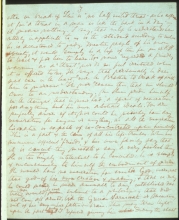Page 9
other or break off. This is "no half veiled threat" as he expresses it for "a threat in a man is like the bark in a dog" — it means nothing. I say, that unless he understands how utterly inapplicable to us is the standard according to which he is accustomed to judge Western people of his own society, it would simply be a loss of time for me or K.H. to teach and for him to learn. We never regard a friendly warning as a "threat," nor do we feel irritated when it is offered to us. He says that personally he does not care in the least, "were the Brothers to break with him to-morrow," the more reason then that we should come to an understanding. Mr. Hume prides himself in the thought that he never had "a spirit of veneration" for anything but his own abstract ideals. We are perfectly aware of it. Nor could he possibly have any veneration for anyone or anything, as all the veneration his nature is capable of is — concentrated upon himself. This is a fact and the cause of all his life-troubles. When his numerous official "friends" and his own family say that it is conceit — they misstate and say a very foolish thing. He is too highly intellectual to be conceited: he is simply and unconsciously to himself the embodiment of pride. He would have no veneration for even his God, were not that God — of his own creation and making; and that is why he could neither be made amenable to any established doctrine, nor would he ever submit to a philosophy that did not come all armed, like the Grecian Saraswati or Minerva, out of his own — her father's — brain. This may throw light upon the fact why I refused giving him during the short


